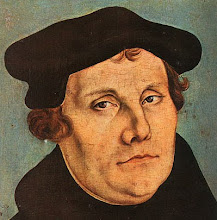ELCA Advocacy Director Speaks to Reporters at Health Care Rally
This news release from the ELCA NEWS SERVICE, offers a voice
in the moral and social public debate going on surrounding the need
for health care reform. We believe that it is an important debate
and worth the time of our readers -- John Spangler
September 18, 2009
ELCA Advocacy Director Speaks to Reporters at Health Care Rally
09-201-JD
WASHINGTON (ELCA) - The August recess of Congress had a volatile
atmosphere surrounding the health care debate, according to the Rev.
Andrew Genszler, director of advocacy, Evangelical Lutheran Church in
America (ELCA) Washington Office, in response to a question from a
Christian Broadcasting Network (CBN) News reporter.
"All people should be heard, but opinions should lead to
constructive discussion by people of good faith, and I think we're still
getting there as a country," Genszler said.
In conjunction with a "National Health Care Affordability Day" rally
here Sept. 16, Genszler was interviewed by Religion and Ethics NewsWeekly
(PBS) and CBN News.
"People of faith care about health care because Jesus was a healer,
and God cares about people in poverty. For Christians, those two
scriptural values converge in this public issue," Genszler said. "Through
congregational and health ministries, Lutherans also know the front lines
of what living with marginal or no health care can do to people and
families."
Regarding cost, Genszler said, "Uninsured people, struggling
families, small-business owners, and the very rich probably look at
affordability differently. All can be asked to be responsible, each
feeling like they are contributing to their own well-being. But many
people will need help to afford even basic care."
The Religion and Ethics NewsWeekly story will air Sept. 20. CBN News
aired its story Sept. 16.
In a joint statement presented at the event, several organizations,
including the ELCA, wrote, "We believe it is essential that the
responsibility to purchase health coverage come with strong consumer
protections and adequate subsidies that make it possible for families
to obtain quality coverage at a cost they can afford.
The rally included testimonies from families and remarks from U.S.
Sen. Michael Bennet, D-Colo. "I have heard their stories ... about the
current unstable system ... and the interruptions they have in their
lives, in their ability to plan, because of the way our health insurance
system works, or maybe, to put it another way, the way it doesn't work,"
said Bennet, holding a book of testimonies presented to him at the event.
National Urban League, American Cancer Society Cancer Action
Network, American Heart Association, Community Catalyst, Consumers Union,
Families USA and People Improving Communities through Organizing (PICO)
National Network sponsored the news conference.
The 2009 ELCA Churchwide Assembly adopted a resolution committing
the church to advocate that "each person should have ready access to
basic health care services that include preventative, acute and chronic
physical and mental health care at affordable cost."
The ELCA Washington Office has been working with faith-based
coalitions for health reform legislation. One such collective effort was
in a nationwide faith call-in held Sept. 15. More than 20,000 calls were
made to members of Congress, urging support for health care legislation.
---
The joint statement on health care affordability is at
http://tinyurl.com/lkm5rg on the ELCA Web site.
For information contact:
John Brooks, Director (773) 380-2958 or news@elca.org
http://www.elca.org/news
ELCA News Blog: http://www.elca.org/news/blog

